Although Yazaki is only the third Japanese company to invest in Serbia, the two countries cooperate closely on the international scene when it comes to topics that are of common interest, in the fields of culture, scientific interchange and tourism. Given the reform processes in Serbia, both sides are looking forward to more vigorous trade exchanges and investment activity
We spoke with H.E. Japanese Ambassador Juichi Takahara about many important issues related to the major geopolitical events that are shaping the world scene, from nuclear threats to terrorist threats, and from Japanese ties with the U.S. to its links with Russia, but also cooperation between Serbia and Japan in many fields, including international relations and investment climate improvement, as well as the humanitarian assistance that Japan is providing to Serbia.
Your region has once again found itself in the focus of international politics following the latest, fifth, and so far largest nuclear test in North Korea. The Japanese Prime Minister announced that this kind of testing must not be tolerated. What can be expected in the coming months if Pyongyang says that the latest test is not the end of the development of its nuclear capacity?
The countries concerned, including Japan, and the international community have repeatedly called on North Korea, with strong warnings, not to conduct any further provocation, including nuclear tests and ballistic missile launches.
In light of the fact that North Korea went ahead with a series of nuclear tests in an unprecedentedly short period of time, as well as the fact that North Korea has this year launched more than 20 ballistic missiles that could serve as a means to deliver weapons of mass destruction, and that it has been enhancing their capability, North Korea’s nuclear development constitutes a grave threat to Japan’s security and seriously undermines the peace and security of the region, as well as the international community.
This nuclear test that North Korea conducted in September, despite these calls, is totally unacceptable
The nuclear test by North Korea is a clear and repeated violation of the relevant United Nations Security Council resolutions and represents a serious challenge to the international disarmament and non-proliferation regime centred on the Treaty on the Non-Proliferation of Nuclear Weapons (NPT) to which many countries, including Japan and Serbia, are the Party States.
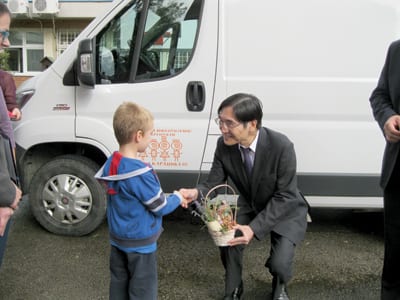
Japan lodges a serious protest against North Korea and condemns the country’s actions in the strongest possible terms.
The international community should strengthen pressure on North Korea to end its nuclear tests and other provocative actions. In this regard, Japan highly appreciates that the United Nations Security Council unanimously adopted Resolution 2321 on 30th November, which notably reinforces sanctions against North Korea by further restricting the flow of people, goods and funds to North Korea.
Japan will take appropriate measures, in close cooperation with the other UN Member States, to ensure the effectiveness of this resolution. Japan strongly urges North Korea to comply faithfully and fully with Resolution 2321 and the series of relevant resolutions, as well as to take positive actions towards denuclearisation.
The international community should strengthen pressure on North Korea to end its nuclear tests and other provocative actions
Japan is a reliable ally of both the United States and Western Europe. In light of the recent meeting of Prime Minister Abe and Russian President Putin, and the declaration on the strengthening of relations with Russia, is it possible in today’s world to lead a policy that implies good relations with both Moscow and Washington?
Strengthening the Japan-United States Alliance and enhancing relations with neighbouring countries, including Russia, are among three pillars of Japan’s foreign policy. Therefore, Japan has been seeking to develop good relations both with Moscow and Washington at the same time.
In May, September and November 2016, Japanese Prime Minister Shinzo Abe held Japan-Russia summit meetings with the President of the Russian Federation, Vladimir Vladimirovich Putin. Prime Minister Abe invited President Putin to visit Japan’s Yamaguchi Prefecture on 15th December and the two sides agreed to hold a Summit Meeting.
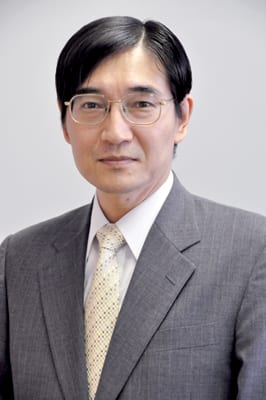
Japan has been engaging in political dialogue with Russia aimed at concluding a bilateral peace treaty through the resolution of the issue of the attribution of the Four Northern Islands of Japan. It is an unnatural state of affairs that these important neighbours, Japan and Russia, which surely have unlimited potential, have still not concluded a peace treaty some 71 years after the end of World War II. We expect President Putin’s upcoming visit to Japan will develop Japan-Russia relations in various areas, including the negotiations on a peace treaty.
Japan and the United States are unwavering allies, linked firmly through the bond of universal values like freedom, democracy, basic human rights and the rule of law. The cooperation and exchanges between Japan and the United States have been close and active in a wide range of fields, including politics, the economy, security and culture at various levels. Indeed, Prime Minister Abe was one of the first foreign leaders to meet with U.S. President-elect Donald Trump on a face to face basis. The meeting, held at Trump’s home in New York on 17th November, was conducted in a friendly atmosphere and was highly meaningful in terms of building personal trust between Prime Minister Abe and President-elect Trump.
Japan, as the holder of the G7 Presidency in 2016, and as an advocate for human security, has been contributing proactively to improving the refugee crisis, working closely with United Nations organisations
How does Japan view the topics currently dominating the European political scene – the migrant crisis, the threat of terrorism and Brexit?
Japan and European countries share basic values of freedom, democracy, human rights, the rule of law and market economy, and also enjoy strong partnerships in various fields, including politics, the economy and security.
In today’s international community, where the global order is beset with challenges, the presence of a strong, united Europe is essential. Japan hopes to further cooperate with Europe, with a view to maintaining the rules-based global order in the international community.
On the issue of the refugee and migrant crisis, the world faces an unprecedented level of refugee and migrant movements, which amounts to serious ongoing humanitarian crises. Therefore, close cooperation among all the relevant states and organisations is essential. Japan, as the holder of the G7 Presidency in 2016, and as an advocate for human security, has been contributing proactively to improving the refugee crisis, working closely with United Nations organisations.
I highly appreciate the Government of Serbia and its local municipalities acting in a responsible and humanitarian manner, despite the hardship caused by the increased transit of refugees and migrants from the Middle East to Western Europe, passing through Serbia, and I encourage them to continue to offer favourable consideration to those people.
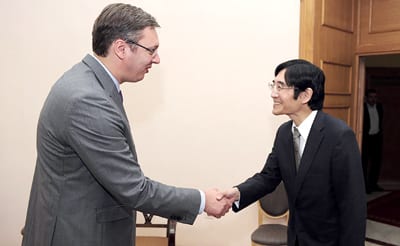
In order to support such Serbian efforts, Japan has been extending grant aid worth approximately seven million U.S. dollars to implement assistance projects for refugees and migrants through international organisations like UNDP, UNHCR, UNICEF, IOM and IFRC. In parallel, Japan is extending aid worth approximately half a million U.S. dollars directly to the municipalities affected by the mass influx of refugees and migrants, such as Preševo and Šid, through the provision of ambulance vehicles, water tank trucks and waste collection vehicles. I am sure that the provision of Japanese assistance will also be beneficial to the citizens of these municipalities.
The threat of terrorism is rapidly growing worldwide. Many innocent people, including Japanese people and Europeans, have been victims of recent terrorist attacks. Terrorism cannot be justified for any reason and must be resolutely condemned.
The international community must unite across a wide range of fields and continue to take enduring measures over the long term to prevent and eradicate terrorism. In this regard, at the G7 Summit Meeting held in Japan in May, leaders endorsed the G7 Action Plan on Countering Terrorism and Violent Extremism to take the lead in international efforts to combat terrorism.
As a responsible member of the international community, Japan will continue to be active in fighting terrorism.
Regarding Brexit, the withdrawal of the United Kingdom from the European Union constitutes an event that will have a substantial impact, not only on the future of European integration but also on the international community as a whole, which is why the world is paying close attention to the Brexit negotiations. This testifies to the expectation that the UK and the EU will continue to lead the world in enlarging and promoting a free and open market economy.
Japan respects the will of the British people, as demonstrated in the referendum, and is keenly monitoring the actions of the British Government. We also admire the way in which the EU has responded to the outcome of the referendum in a quick and calm manner. Although the negotiations are sure to encounter difficulties from time to time, Japan has no doubt that the UK and the EU will overcome such difficulties and lay the foundations for the creation of a new Europe.
Japan hopes earnestly that the Brexit process will move forward smoothly so that the world economy avoids major disruption.
You have been in Serbia for a year already. How do you assess the level of cooperation between the two countries?
I am satisfied with the close cooperation and lively exchange between Serbia and Japan in various fields and levels, to which many players give their active contribution.
For instance, our two governments cooperate on the international scene in various fora, with regard to topics of our common interest.
On the economic side, there is still room to strengthen our ties in the areas of direct investment, trade and tourism.
On the other hand, I am impressed by the interest shown by Serbian people in Japanese culture and sports. This year approximately 7,000 people participated in “Japanizam” and about 8,000 people are practising Japanese martial arts. Japanese professors and researchers, on their part, visit Serbia to complete studies in byzantine art, frescoes, Balkan history etc. Moreover, the University of Belgrade has very intense cooperation and exchanges with many academic institutions in Japan.
In addition, I hope that the exchange in sports will be further enhanced as we approach the 2020 Olympic and Paralympic Games in Tokyo.
You previously announced the arrival in Šabac of Yazaki, one of the world’s largest manufacturers of auto parts. Will these expectations be realised?
Japanese direct investments are still limited to only two companies in Serbia: Japan Tobacco International (JTI) in Senta and Panasonic Lighting Devices Serbia in Svilajnac. However, I am proud to note that, since the inception of their operations, these companies have been contributing continuously to the Serbian economy, both national and local, in terms of the creation of jobs, acquisition of foreign currency and tax revenue. They have been making progress in hiring new employees and constantly expanding their production and export.
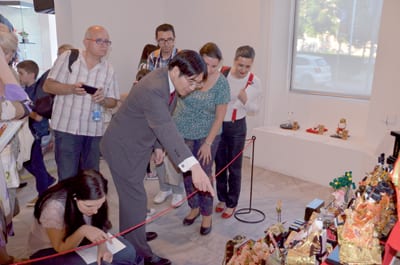 In May this year, representatives of the Government of the Republic of Serbia, the City of Šabac and Yazaki Corporation, a global automotive parts supplier, signed a Memorandum of Understanding and in 2017 Yazaki Corporation will start building its wire harnesses factory in Šabac, investing about 25 million dollars in the process. This is the first Japanese greenfield investment in Serbia and plans are to employ 1,700 people by 2019.
In May this year, representatives of the Government of the Republic of Serbia, the City of Šabac and Yazaki Corporation, a global automotive parts supplier, signed a Memorandum of Understanding and in 2017 Yazaki Corporation will start building its wire harnesses factory in Šabac, investing about 25 million dollars in the process. This is the first Japanese greenfield investment in Serbia and plans are to employ 1,700 people by 2019.
I expect that the success stories of these companies will attract the attention of more Japanese investors.
I highly appreciate the efforts of the Government of Serbia in terms of economic reform, which leads to the improvement of the country’s business and investment environment.
In a previous interview for our magazine, you spoke about preconditions for the greater presence of Japanese investors in Serbia. You said at that time that the most important conditions for foreign investors are the rule of law and the enforcement of laws, strong institutions and a level playing field for all market participants. Have you seen a shift in any of these areas, and where else do you see challenges?
On the side of the investor, a decision to invest in a country is a long-term policy, and it has to be given very thorough consideration, taking into account various elements in each possible investment location. Therefore, attracting investments is a competition, with other countries and between regions and municipalities.
Central and local governments are expected to constantly attempt to create and maintain good conditions for investments. Japanese businesspeople seek political and economic stability, transparency and accountability of various systems, consistency in policy implementation, regulatory efficiency, as well as assurances of fair market competition, which enables them to receive assurances about the predictability of the investment situation of the host country and the reduction of business costs, which are of great importance to any investor.
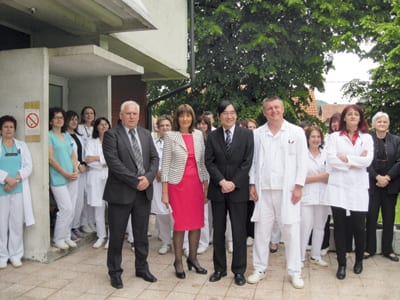 In this regard, I highly appreciate the efforts of the Government of Serbia in terms of economic reform, which leads to the improvement of the country’s business and investment environment. We recently witnessed a further increase in the GDP growth rate, a reduction of the unemployment rate, as well as exceptional results in fiscal consolidation and budgetary surplus for the first time in a long period. The positive outcome of macroeconomic data is also reflected in the latest World Bank Doing Business List and the Global Competitiveness Index of the World Economic Forum, where Serbia has made steady improvements.
In this regard, I highly appreciate the efforts of the Government of Serbia in terms of economic reform, which leads to the improvement of the country’s business and investment environment. We recently witnessed a further increase in the GDP growth rate, a reduction of the unemployment rate, as well as exceptional results in fiscal consolidation and budgetary surplus for the first time in a long period. The positive outcome of macroeconomic data is also reflected in the latest World Bank Doing Business List and the Global Competitiveness Index of the World Economic Forum, where Serbia has made steady improvements.
Provided the strategic course of action taken by the Government of Serbia remains unchanged, I expect the constant improvement of Serbia’s business environment, which would lead to further economic development, despite occasional ups and downs.
For its part, the Embassy of Japan is ready to help in the creation of an encouraging climate for investors in this country, in cooperation with the JETRO (Japanese External Trade Organisation) Office in Vienna, which is in charge of the promotion of investment and trade, for the dissemination of information on Serbia among Japanese business circles, and for drawing their attention to this country, as well as the JICA (Japan International Cooperation Agency) Balkan Office in Belgrade for the improvement of the economic and social infrastructure of Serbia and for institutional capacity building through economic and technical cooperation projects.
Serbia was promoted as a potential tourist destination in Japan at the end of September. On that occasion, offers of trips to three countries – Serbia, Albania and Montenegro – were promoted. Given the habit of Japanese tourists to stay in one place for shorter periods, or to prefer more varied arrangements, how interesting do you think this region can be for Japanese tourists?
Japanese people like travelling abroad, visiting numerous places, such as historical monuments and world heritage sites, tasting local food and drinks, appreciating traditional festivals and other cultural events, as well as searching for interesting souvenirs.
After visiting many corners of Serbia, and after seeing, among other sights, Fruška Gora and the Ov?ar-Kablar Gorge, I was impressed by the country’s history, monasteries with frescoes, scenic beauties and delicious food and wine. I am convinced that Serbia has the potential to attract more Japanese tourists.
Unfortunately, Serbia is still not so well known as a tourist destination in Japan. It needs to gain more attention from the Japanese public and to be better promoted. Japan is willing to cooperate with Serbia in this field as well and has dispatched its expert – the JICA Regional Advisor for National Tourism Organisations in the Balkan Region. In that context, I welcome the participation of Serbia in the Tourism Expo Japan every year.
I sincerely hope that these efforts will bear fruit and that many Japanese people would choose Serbia as their travel destination, to enjoy its various attractions and charms.
Japan is willing to assist Serbia with its measures in the field of environmental protection, such as reducing air pollution and developing sewer systems, by using financial assistance schemes, such as ODA loans and small-scale grant aid, as well as technical cooperation
Japan is a major donor in Serbia. The total value of projects implemented to date is around 500 million euros. Some of the areas in which investments have been made include education and ecology. Why are they a priority for your country?
Japan has been providing economic and technical assistance to Serbia since 1999, in order to secure a stable society and sustainable development and to promote Serbia’s efforts in its accession to the EU by using Japan’s advanced technology and experience.
The main areas of assistance are based on three pillars: private sector development, environmental protection and healthcare & education.
In order to realise economic development in Serbia, it is imperative that the private sector is soundly developed through investments from foreign countries, including Japan. In that context, it is essential to improve the investment climate. Japan assists Serbia in this field through Japanese technical assistance, utilising Japanese expertise and know-how in the area of small and medium-sized enterprises, production management for raising productivity and promoting tourism, as well as by developing economic infrastructure financed through ODA loans.
Japan is willing to assist Serbia with its measures in the field of environmental protection, such as reducing air pollution and developing sewer systems, by using financial assistance schemes, such as ODA loans and small-scale grant aid, as well as technical cooperation.
From the viewpoint of human security, Japan continues to assist Serbia in its efforts to reduce wide disparities between developed and underdeveloped areas of the country, in particular in the field of healthcare and education, and to directly support socially vulnerable people.